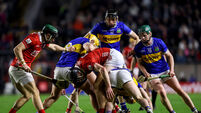Al-Qaida hold-outs face new surrender deadline
Al-Qaida fighters holding out in the terror gang’s final Afghan stronghold were this morning facing an new deadline to surrender and were also being urged to hand over their leaders as well.
As the deadline of noon (7.30am Irish time) set by tribal chiefs passed, SAS troops were preparing for a final assault on hundreds of diehard Osama bin Laden fighters cornered in the Afghan mountains where he is thought to be hiding.














